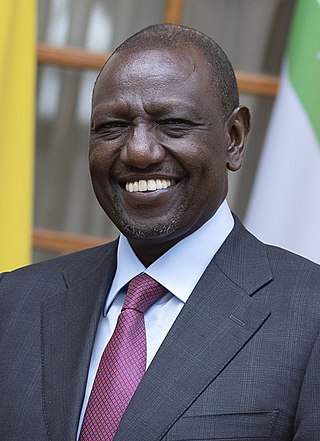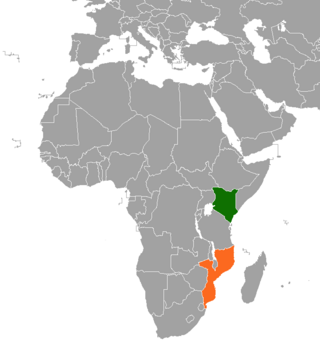Related Research Articles

The politics of Kenya take place in a framework of a presidential representative democratic republic, whereby the president is both head of state and head of government, and of a multi-party system in accordance with a new constitution passed in 2010.

Uasin Gishu County is one of the 47 counties of Kenya located in the former Rift Valley Province. Eldoret has the county's largest population centre as well as its administrative and commercial centre. "It lies between longitudes 34 degrees 50' east and 35 degrees 37' West and latitudes 0 degrees 03' South and 0 degrees 55' North. It is a highland plateau with altitudes falling gently from 2,700 meters above sea level to about 1,500 meters above sea level. The topography is higher to the east and declines gently towards the western border".

William Kipchirchir Samoei Arap Ruto is a Kenyan politician who is the fifth and current president of Kenya since 13 September 2022. Prior to becoming president, he served as the first elected deputy president of Kenya from 2013 to 2022. Previously, holders of the position were referred to as Vice President and the officeholder was unelected and appointed by the President. He previously served in three cabinet portfolios as the Minister for Home Affairs, the Minister of Agriculture and as Minister for Higher Education.

Wycliffe Musalia Mudavadi is a Kenyan politician and land economist who is currently serving as Prime Cabinet Secretary of Kenya and expanded role of Foreign & Diaspora Affairs Minister of Kenya, he is a former party leader of the Amani National Congress (ANC), one of the founding political parties, of the Kenya Kwanza alliance. He served as the 7th Vice-President of Kenya in 2002 and Deputy Prime Minister (2008–2012), when he resigned to contest for the Presidency in the 2013 Kenyan general election and emerged third. He was the deputy party leader of the Orange Democratic Movement (ODM) (2005–2012) and Party Leader of the United Democratic Forum Party (UDF) from May 2012 to July 2015.
The Cabinet of the Republic of Kenya is made up of the President, Deputy President, Attorney General and Cabinet Secretaries. The 2010 Constitution of Kenya allows a maximum of 22 ministries under Article 152 and sets the minimum number to 14. A Cabinet Secretary is not a member of the Kenyan Parliament and has to be vetted by a parliamentary committee before their appointment.

Corruption in the government of Kenya has a history which spans the era of the founding president Jomo Kenyatta, to Daniel arap Moi's KANU, Mwai Kibaki's PNU governments. President Uhuru Kenyatta's Jubilee Party government, and the current William Ruto's Kenya Kwanza administration has also been riddled with massive cases of graft.

China–Kenya relations refer to the bilateral relations between the People's Republic of China and Kenya. The two countries established relations in 1963, suspended ties temporarily in 1967, but ultimately re-established diplomatic relations in 1978. Since then, they have significantly expanded their economic and investment agreements, such that China is currently Kenya's largest trading partner. While the robust trade, investment, and Chinese-led infrastructure projects have benefitted Kenya's overall development and have been labelled by both governments as "win-win" collaborations, local media and foreign analysts have increasingly criticized both the potential consequences of Kenya's loans from China as well as Kenya's overall economic dependence on foreign capital and products. The most ambitious collaboration, the Standard Gauge Rail that was planned to connect Nairobi, Kenya, Uganda, South Sudan, and Rwanda using Chinese financing and contractors, has attracted even more controversy due to financial complications, questions on the legality of its tender process, and the alleged collateralization of Kenya's Mombasa port.
Erupting in June 2008, the Grand Regency Scandal concerns the sale of the Grand Regency Hotel in Downtown Nairobi, Kenya, from the Central Bank of Kenya to an unspecified group of Libyan investors called "Libya Arab African Investment Company". The sale was directed by Finance Minister Amos Kimunya, leading to the passage of near-unanimous censure of Kimunya by the Kenyan Parliament on 1 July 2008. On 8 July 2008 Kimunya submitted his resignation, and called for an investigation to clear his name.

Mau Forest is a forest complex in the Rift Valley of Kenya. It is the largest indigenous montane forest in East Africa. The Mau Forest complex has an area of 273,300 hectares.
A list of happenings in 2010 in Kenya:

General elections were held in Kenya on 4 March 2013. Voters elected the President, members of the National Assembly and newly formed Senate. They were the first elections held under the new constitution, which was approved in a 2010 referendum, and were also the first run by the new Independent Electoral and Boundaries Commission (IEBC). They coincided with the 2013 Kenyan local elections.
Food safety incidents in Taiwan have received international media scrutiny.
The Embassy Property Purchase Scandal is a scandal that resulted in the Kenyan Minister for Foreign Affairs Moses Wetangula leaving his post. Wetangula left his ministerial post on October 27, 2010, due to ongoing investigation on his alleged involvement in the Kenyan Tokyo embassy scandal.
The KPC Ngong Forest Land Scandal was a scandal that resulted in the suspension in October 2012 of Kenyan Government Minister William Ruto who was charged in court as a result.

Kenya–Mozambique relations are bilateral relations between Kenya and Mozambique. Both nations are members of the African Union, Commonwealth of Nations and the United Nations.
The Mombasa–Nairobi Standard Gauge Railway, completed in 2017, was built as the first phase of the Kenya Standard Gauge Railway. It is a standard-gauge railway (SGR) in Kenya that connects the large Indian Ocean city of Mombasa with Nairobi, the country's capital and largest city. This SGR runs parallel to the narrow-gauge Uganda Railway that was completed in 1901 under British colonial rule. The East African Railway Master Plan provides for the Mombasa–Nairobi SGR to link with other SGRs being built in the East African Community.

Noordin Mohamed Haji, OGW, CBS is a Kenyan advocate of the High Court of Kenya, a position he has held for the last 21 years and the current Director of Public Prosecutions, replacing Keriako Tobiko who resigned in 2018. He is the second Director of Public Prosecutions after the promulgation of the Constitution of Kenya 2010, which made the Office an independent entity from the Attorney General's Office, which it had been previously under.

Chris Kiptoo is a Principal Secretary (PS) for National Treasury in Kenya. He assumed office on 4 December 2022, following reassignment by H.E. President wiliam ruto. He has also had a career spanning 15 years at the Central Bank of Kenya (CBK) as a manager during which he was seconded to the International Monetary Fund (IMF), the Capital Markets Authority of Kenya (CMA) as Senior advisor and manager special projects, and to the Office of the Prime Minister (OPM) Kenya as economic adviser to the prime minister, then Raila Odinga. Kiptoo also had a short stint at National Cereals and Produce Board (NCPB).

Geoffrey Rigathi Gachagua is a Kenyan politician who is serving as Deputy President of Kenya since 2022. He previously served as the Member of Parliament for Mathira Constituency between 2017 and 2022 as a member of the Jubilee Party. In the 2022 election, William Ruto selected Gachagua as his running mate, and the two were elected with just over 50% of the vote.
Peninah Malonza, OGW, is a Kenyan politician who serves as the current Cabinet Secretary for Ministry of EAC, Arid and Semi-Arid Lands and Regional Development, in the Cabinet of Kenya, and Ex Officio Member of the East African Legislative Assembly (EALA) effective 5 October 2023. Prior to this appointment, from 27 September 2022 until 4 October 2023, she served as the Cabinet Secretary for Tourism, Wildlife and Heritage, the President of the 13th Governing Council of the Parties to Lusaka Agreement Task Force (LATF) on Cooperative Enforcement Operations Directed at Illegal Trade in Wild Fauna and Flora as well as the Vice Chairperson of World Tourism Organization (UNWTO) Regional Commission for Africa (CAF).
References
- ↑ Maize scandal: The lies and the facts, Daily Nation, 5 February 2009
- ↑ "Revealed: Sh150 million maize scandal", Daily Nation, 10 January 2009. Retrieved 13 May 2009. Archived 29 July 2009.
- ↑ "Raila on the spot over contaminated maize", Daily Nation, 13 May 2009
- ↑ "KACC questions another minister over maize scam". The Standard. 25 February 2009. Archived from the original on 23 March 2009.